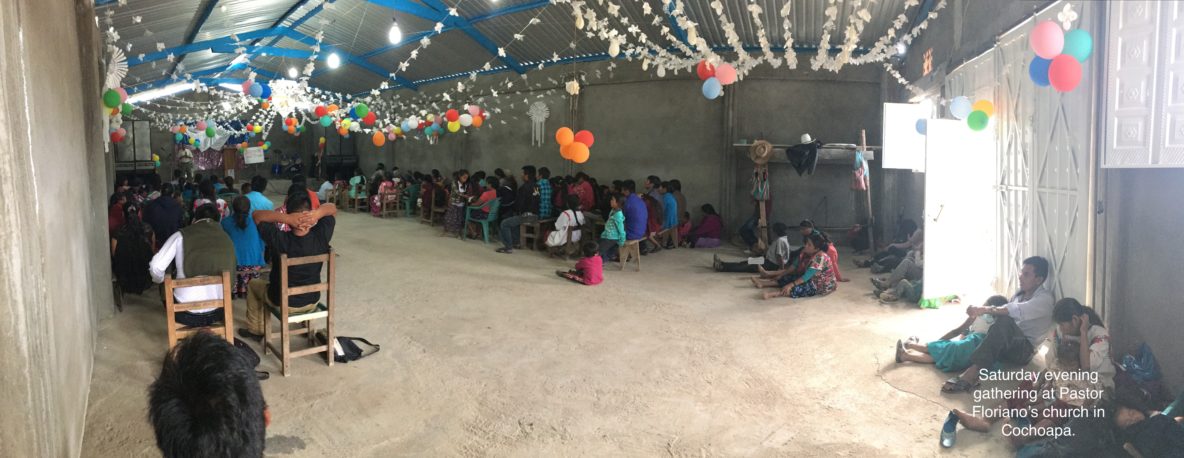The perseverance of the Christians in Yuvinani is legendary. They stand among the mountains as witnesses for both the vulnerable meekness and the steady strength of the Christian gospel. As such, they have not gone unnoticed. The news is spreading.
Everyone on the roof has graciously forgotten the disgrace of my two tortillas. More nearby villages are mentioned—some villages which have just received the New News, others which have yet to hear. Isaul remarks of several Christian brothers jailed in San Cristobalito for refusing to participate in festivals, and another imprisoned in Naranjo for the same offense. In Cochoapa, a family was denied the use of the town cemetery after the death of their father, due to his faith in Jesus. Chris chimes in, telling the story of a woman in Vista Hermosa who, just days after becoming a Christian, was jailed; upon returning to her home, she found her house ransacked and her belongings burned. The governing bodies of the villages continue to be widely set against the economic and cultural disruption brought about by Christianity. Even as our small delegation chats atop the house of Paulino, the scant Christian community in the Metlatónoc/ Cochoapa region is working to elect a new public official who has promised her support toward fighting religious persecution among the mountain villages. Isaul and Chris speak hopefully of this election, but their eyes betray a deep skepticism over the likelihood of its success.
Our conversation abruptly ends, as cheers and excitement arise from the far end of the table. Paulino has brought out the next course of our meal. As fruit is passed around, and I prepare my digestive system for the worst, a rustle of pages erupts as black books are brandished from backpacks and under chairs. The Christian brothers from Cochoapa are here again, this time not to pray over Paulino’s wife, but to teach the New News to his whole family. At Paulino’s invitation they have become regular guests at his house, coming weekly ever since the healing. Today several members of Paulino’s extended family are here to listen as well. While Paulino remains skeptical, his wife was baptized as a follower of Jesus just a few weeks ago, becoming one of the first Christians in Metlatónoc. As everyone opens their black books, they begin to read a language I do not understand—Mixtec of course—in the faithful pages of the Hansen translation of the New Testament.
Just for a moment my ailing stomach is eclipsed by a beautiful and eternal profundity: Displayed before heaven and earth on this rooftop is the ever undying testimony to the steady advance of the global Church. Far from her cavalier and occasionally coquettish stance in North America, the Church rising alongside the Mixtec is a genuine provocateur of the soul, sufficiently new to inspire radical change and sufficiently old to ground its people to the stars themselves. This moment in Metlatónoc is not far removed from the ancient Palestinian hillside of Olivet where the words of Jesus were first heard by so many weary souls. Here among the Mixtecs, the Christian brothers teach while Paulino’s family listens, Paulino himself taking notes thirstily. In these mountains, Jesus’ old promise to his friends is clearly recognizable in the words, “Behold, I am with you to the end of the age,” even as Paulino’s relatives make their own ancient exclamation: “We have never heard teaching like this before.”
Author’s note: This brief history of the Christian gospel’s influence among the Mixtec villages in the Metlatónoc/Cochoapa region is by no means a sweeping representation of Mexican indigenous ministry as a whole. My article describes a very small piece of the elaborate and diverse spread of Mixtec communities separated from one another by dialects and mountain ranges. Further, to speak solely of the Mixtecs is to say nothing of the Nahuatl or Zapotec peoples also inhabiting the southern Sierra Madre mountain range, each with its own dialects and divisions. In no uncertain terms, the task of gospel work among these populations is unshakably complex and in many cases very dangerous. Nevertheless, the work continues by the rugged hands of the men, women, and children great enough to consider themselves very little when compared to the treasure that is Christ.
Also note: Some of the names in this article were changed or not given in their entirety to protect the identities of the individuals and organizations at work among the Mixtec people.

